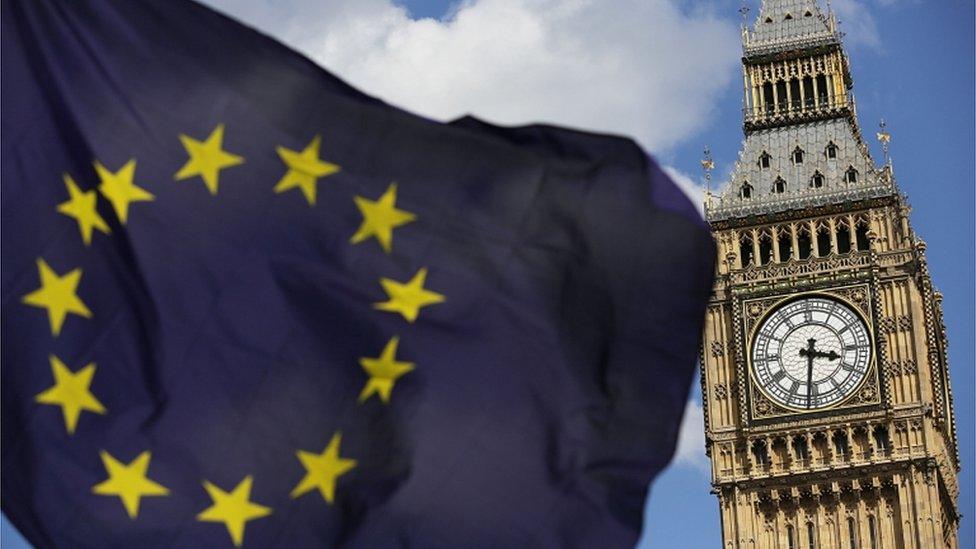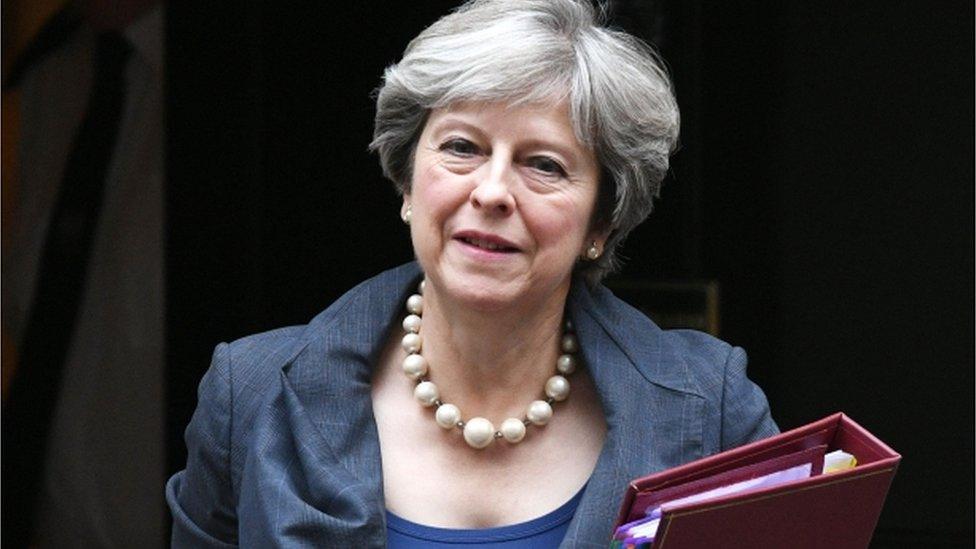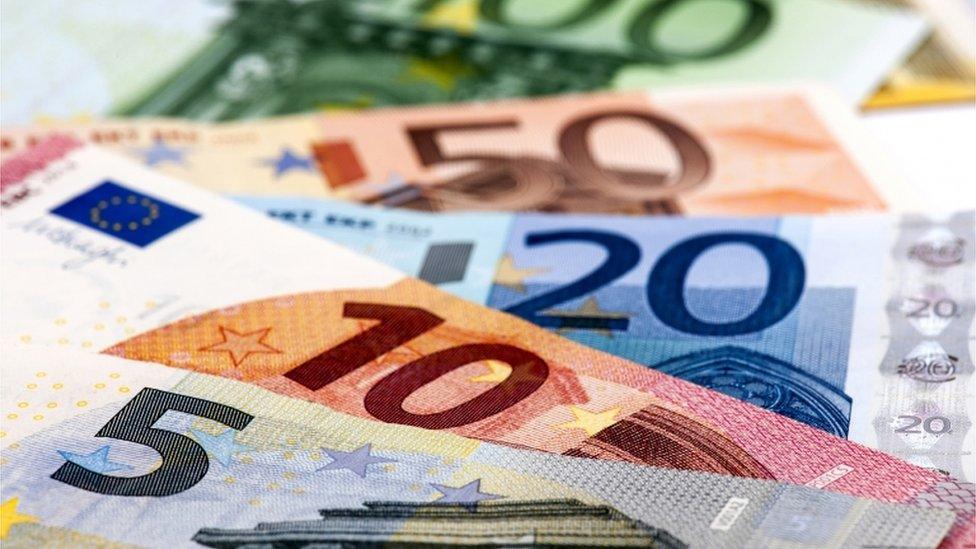Brexit viewed from Brussels (4): Show us the money
- Published

It's a divorce bill, or alimony, or perhaps the severance bill when you leave the club. To President Jean-Claude Juncker, it's like the commitment to stand your round in the pub.
There are various parallels to help explain the bill the United Kingdom leaves as it leaves the European Union. None captures either the complexity or the scale.
And none of them have been explained to the British people. According to Foreign Secretary Boris Johnson, the European can "go whistle" for the kind of money they've been talking about.
You probably recall that Michel Barnier didn't hear whistling. He heard the sound of a clock, as it runs down to March 2019, which is the self-imposed deadline the British have chosen to make their departure.
Agreed and fudged
You'll recall that the first stage of talks, according to the the European Commission negotiating team, requires a deal to retain the open border between Northern Ireland and the Republic of Ireland. That is although no-one is clear how that will be possible if Britain is out of the customs union.
Then, there's the protection of rights of three million or so non-UK EU citizens living in the UK, and whether their rights will be guaranteed under the European Court of Justice.
Experience of European politics tells us that these two can be both agreed and fudged, and the details of a broad agreement left to a later stage. In any case, the detail on both will probably depend on future relationships.

The money is proving to be a lot more difficult. Unlike the other two priority areas, there are (obviously) competing interests for the outcome. For the European side, it's absolutely vital to get a British commitment before moving on to discussion of trade.
For the British, there's no point in agreeing a payment, or series of payments, until it's known whether the Europeans are going to allow for an open trade regime.
Without a liberal deal on trade, why would Westminster be willing to pony up billions of pounds, Euros or both?
'Honour commitments'
So far, there's been one concession on the cash. It came from Theresa May in her Florence speech, when she opened the door to a two-year transition deal and a payment to meet Britain's commitments from its membership.
"I do not want our partners to fear that they will need to pay more or receive less over the remainder of the current budget plan as a result of our decision to leave," said the Prime Minister. "The UK will honour commitments we have made during the period of our membership."
Though she didn't offer a number, that was interpreted as £20bn. That's the amount Britain would pay to get to the end of the seven-year budget, which comes in December 2020.

Having left in March 2019, Britain would be willing to keep paying its membership dues - in exchange for continued access to the European Union club it currently has, notably on free trade.
This would cover a large part of the implementation or transition phase. It could also mean that Britain's share of the Common Agricultural Policy could continue to flow through Brussels to UK farmers
That at least reassures the net contributors, led by Germany and now including 10 others, that they won't have to fill the gap in the EU budget left by the British.
It also reassures the net recipients, meaning mostly the eastern members, that the promises on which they have been planning, for improvements to infrastructure, market reforms and social funds, will be funded for this budget round at least.
Liabilities
The other two areas are much more complex and contentious. One is the liabilities. That includes pensions for EU officials, which are not collected in a fund but paid out of future budget contributions. very hard to calculate.
It's not just that Britain pays towards the pensions of UK nationals working in the EU institutions in Brussels. The European side is looking for Britain's budget share on that bill, which is considerably more. The money wouldn't have to be paid in a single tranche, but would, like most pensions, be multi-year payments as liabilities fall due.
There are liabilities also for loans made by the EU to outside countries - to the Ukraine, for instance, and internally, to Ireland. There's a price attached to that, though the loans may be repaid.
Then there's commitments made by the EU while Britain has been round the table: commitments to build infrastructure, such as transport links in Eastern Europe, the social fund which helps develop skills and support communities.
These commitments continue into the next seven-year budget, which means going to 2023 and perhaps as far as 2025. Typically, a programme takes five years. Less than half of spending in any one year is mandated for that year.
The Bruegel Institute in Brussels has done some calculating of what this might come to. Back in March, it published its findings, external.

The continuation of the 2014-20 budget, or multi-year financial framework (MFF) carries a spending commitment of 580bn Euros in total between 2019 and 2025.
Further commitments made round the EU table at meetings before the date of the Brexit vote add 389bn Euros, spread from 2019 to 2023.
How much should Britain's share of that be? Perhaps the 17% headline gross figure (something like the figure £350m per week, painted on the side of a Leave campaign bus).
But there is a net figure, after Britain has benefited from the spending of that money. It also gets a rebate, as a share of the net figure, and that could be factored in - each calculation arriving at very different results.
Bruegel economists suggest 70bn Euros if none of the money is recycled into the UK. Once that has been taken away, it looks more like 41bn Euros.
And then there's the "alimony" - the continuing payments for programmes that suit both sides. The obvious examples are the Erasmus student exchange scheme and the science and technology research budget. Britain does relatively well out of both. But in both cases, there's little realistic expectation that Britain will be allowed in unless it's a net contributor.
'Peanuts'
So the roughly agreed part is £20bn for the budget through to 2020. Agreed, that is, that it's a starting point. On the other side of the negotiating table, the EU27 don't think it's enough. It was described ahead of the recent summit by the president of the European Parliament as "peanuts".
He has something more like £50bn in mind. There have been reports of £60bn, up to £100bn. Pounds or Euros? Well, it may not matter for much longer as they are close to parity. The official position is that they don't comment on figures.
A British government source offers two other numbers - £18bn as the basic commitment through to December 2020, and £79bn for the maximum. Candidly, the source accepts that a number somewhere between those will have to be paid, and that it would have been wise to prepare public opinion for that a long time before the Florence speech.
"The Florence speech should have promised that funding and unilateral acceptance that EU citizens are welcome to stay, and it should have been made about a year earlier," said the source.
The speech wasn't the first concession. The Barnier team were surprised back in June, as talks got under way, when the British negotiators conceded they had continuing liabilities. However, the Brits came back in July to say they'd run the numbers, and the bill came to zero. That didn't help the tone of the talks since then.
Another factor is the single market. As things stand, the UK government doesn't want Britain to be in the single market. But there is pressure coming from some Tories and from some in Labour to re-think that.
If, like Norway or Switzerland, there is access to the single market, there would be market fees to pay, to sustain the costs of maintaining it. They may, technically, be voluntary contributions, but not in the sense that the donor has much choice.